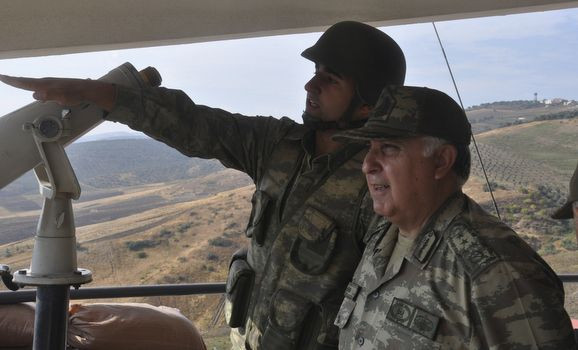Turkey And NATO Have No Desire To Repeat Libya-Type Campaign In Syria

Turkey has the right to defend itself, NATO Secretary General Anders Fogh Rasmussen said on Tuesday. “I would like to commend the Turkish government for the restraint it has shown in its response to the completely unacceptable Syrian attacks,” he said, as Turkey and Syria approached a whole week of exchanging shells across the border, killing at least five people so far.
“Obviously, Turkey has a right to defend herself within international law,” Rasmussen said on Tuesday, before also pledging that NATO “has all necessary plans in place to protect and to defend Turkey if necessary,” but it gave no further details, the AFP said.
But on Wednesday Rasmussen also said, “We hope [protecting Turkey] won’t be necessary, we hope that both countries will show restraint and avoid an escalation of the crisis.”
U.N. Secretary General Ban Ki-Moon said in a statement that he was “alarmed” by the fledgling new conflict between Syria and Turkey, and he “urged restraint” from both sides but has not said more about the U.N.’s position. Neither the U.S. State Dept. nor U.S. President Obama has spoken up on the issue yet.
The New York Times said it was not clear what caused the original shelling, or whether or not it was an accident, but Mustafa Alani, a Middle East analyst at the Geneva-based Gulf Research Center, told the AP, “It’s not an accident. You can’t send shells across the border by mistake five days in a row.”
Turkish commentator Sami Kohen speculated in a piece in the Turkish newspaper Milliyet that President Bashar al-Assad, short of dragging Turkey into an all-out war, might be trying to “wipe out the rebels in the border zone and compel Turkey to stop supporting the opposition militants.”
And Ankara “doesn’t want war, but is ready for it … and is now armed with parliamentary approval,” Kohen wrote.
A new MetroPoll also shows that the majority of Turkish citizens don’t want to intervene in Syria.
Meanwhile, Turkey is sending conflicting messages on the issue of escalation, claiming that it has "little appetite for war,” Volker Perthes, director of the German Institute for International and Security Affairs, said to the AP, but it is still sending explosives over the border.
Joshua Alvarez, managing editor of the Turkish Kalem Journal, also told the AP that Turkey was unlikely to actually call upon NATO’s help since it is aware of NATO’s “extreme reluctance about repeating a 'Libya-styled' campaign in Syria. Turkey wants no part in such a campaign, either.”
Alani also said that any NATO involvement could quickly inflame the entire region, also pointing to Libya as a precedent. The current threat of conflict spillover, Alani said, would pressure the West into drafting a diplomatic solution that would allow for Assad’s graceful exit, instead of him “ending up like Gaddafi.”
Turkish Prime Minister Recep Tayyip Erdogan responded to criticism on Tuesday about his handling of Syria, saying that Turkey could not afford to “remain indifferent” to what was happening across the border, Anadolu Agnecy reported.
“Turkey does not have an eye on land or sovereignty of any country,” Erdogan said. “Turkey’s sensitivity regarding Syria stems from neighborly and friendly ties.” He added that Turkey is “exerting efforts to save Syrian people from chaos and cruelty,” Turkish Weekly reported.
Syria, for its part, could simply be continuing with the shelling in order to send a message that the outside world should not be interfering, the AP speculated.
Meanwhile on Wednesday, more mortar shells from Syria rained down on Azmarin, a Syrian town on the Turkish border, as the Turkish army continued to strengthen its presence along its 900-km (560-mile) border with Syria, Today’s Zaman said.
Turkish Chief of General Staff General Necdet Özel, speaking in Akçakale, the town originally hit by the first Syrian mortars, told reporters with him that “Turkey … will respond even more stronger,” if the attacks from Syria continue.
“We are here, and we are standing tall,” he said, the Hürriyet Daily news reported.
© Copyright IBTimes 2025. All rights reserved.






















